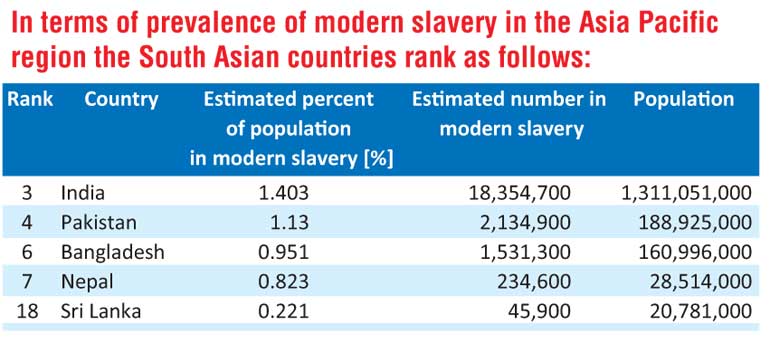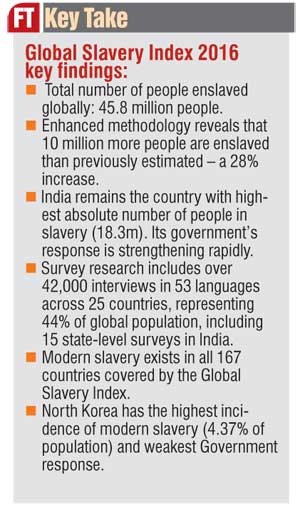Sunday Feb 22, 2026
Sunday Feb 22, 2026
Tuesday, 19 July 2016 00:01 - - {{hitsCtrl.values.hits}}
An estimated 45.8 million men, women and children around the world are trapped in modern slavery - 28% more than previously estimated.
They are enslaved through human trafficking, forced labour, debt bondage, forced or servile marriage or commercial sexual exploitation. This is revealed in the2016 Global Slavery Index, the flagship research report published recently by the Walk Free Foundation.
In terms of absolute numbers, India remains the highest with an estimated 18.35 million enslaved people, followed by China (3.39m), Pakistan (2.13m), Bangladesh (1.53m) and Uzbekistan (1.23m). Combined, these five countries account for almost 58% of the world’s enslaved, or 26.6 million people.
The 2016 Global Slavery Index estimates that 28% more people are enslaved than reported in the 2014 edition. This significant increase is due to enhanced data collection and research methodology. Survey research for the 2016 Global Slavery Index included over 42,000 interviews conducted in 53 languages across 25 countries, including 15 state-level surveys in India. These representative surveys cover 44% of the global population.
India, Pakistan and Bangladesh are among the top five countries with highest number of people trapped in modern slavery in absolute numbers. Forced and child marriage persists in countries throughout the region, particularly in India, Bangladesh, Nepal and Pakistan.

The Global Slavery Index also tracks government actions and responses to modern slavery. Of the 161 assessed, 124 countries have criminalised human trafficking in line with the UN Trafficking Protocol and 96 have developed national action plans to coordinate government response. The governments leading the charge against modern slavery are The Netherlands, the United States of America, the United Kingdom, Sweden, Australia, Portugal, Croatia, Spain, Belgium and Norway.
While India remains the country with the highest number of enslaved people in absolute terms, it has made significant progress in introducing measures to tackle the problem. It has criminalised trafficking, child prostitution and forced marriage.
The Indian Government is massively reforming, consolidating and modernising its legislation against all forms of human trafficking  which will also now include forced labour. The Indian Government is also expanding the number of anti-trafficking units across the country and taking steps to create a central national investigation agency. The government is also working hard to improve its existing victim protection and recovery support.
which will also now include forced labour. The Indian Government is also expanding the number of anti-trafficking units across the country and taking steps to create a central national investigation agency. The government is also working hard to improve its existing victim protection and recovery support.
In March 2016, members of parliament from 13 Asia-Pacific nations, including Bangladesh, India, Nepaland Pakistan, endorsed the Kathmandu Declaration to end child marriage in South Asia.
Andrew Forrest, Chairman and Founder of Walk Free Foundation, said eradicating slavery makes sense, morally, politically, logically and economically, and called on the governments of the world’s leading economies to provide an example to others by enacting and implementing robust anti-slavery measures.
“We call on governments of the top 10 economies of the world to enact laws, at least as strong as the UK Modern Slavery Act 2015, with a budget and capability to ensure organisations are held to account for modern slavery in their supply chains, and to empower independent oversight. Leaders of the world’s major economies must bring the power of business to this issue, by requiring a focus on supply chain transparency.”
“I believe in the critical role of leaders in government, business and civil society,” Forrest said. “Through our responsible use of power, strength of conviction, determination and collective will, we all can lead the world to end slavery.”
Forrest emphasised the key role that business needsto play in eradicating slavery: “Businesses that don’t actively look for forced labour within their supply chains are standing on a burning platform. Business leaders who refuse to look into the realities of their own supply chains are misguided and irresponsible.”
The Global Slavery Index report can be found at www.globalslaveryindex.org